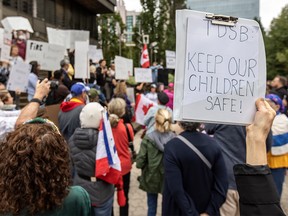Concerns about the cost of living, inflation, and a possible economic recession are among the leading causes of financial anxiety
Article content
One-third of Canadians expect to reduce their spending in 2025, according to a new BMO survey.
The poll conducted by Ipsos reveals that 33 per cent plan to minimize spending and nearly half (46 per cent) of Canadians say the higher cost of living will affect their financial new year’s resolutions.
Concerns about the cost of living (54 per cent), inflation (50 per cent), and a possible economic recession (42 per cent) are among the leading causes of financial anxiety. Others include concerns about overall financial situations, fear of unknown expenses, housing costs, family related expenses and keeping up with monthly bills, according to the BMO Real Financial Progress Index report.
Advertisement 2
Article content
The survey revolves around what Canadians are most concerned about when it comes to their financial new year’s resolutions, says Tony Tintinalli, head of specialized sales at BMO.
“Do they have enough money for retirement, are they planning for vacations, how do they wanna pay down debt,” Tintinalli said. Financial resolutions are “really about doing an update as we go into the new year.”
Canada’s fiscal update was tabled this week in the House of Commons, which revealed a $62 billion deficit — more than 50 per cent higher than the $40 billion projected in Chrystia Freeland’s spring budget.
The former finance minister resigned hours before she was set to deliver the fiscal statement, questioning her own government’s economic policy and describing a disagreement on Canada’s fiscal direction.
Before her resignation, sources told the National Post that the government planned to delay the Working Canadians Rebate, an affordability plan which would have sent $250 cheques to all working Canadians who made less than $150,000 in 2023.
The fiscal update did not include the promised Working Canadians Rebate.
Article content
Advertisement 3
Article content
Recommended from Editorial
It did, however, detail $23.3 billion in new spending over the next three years, as well as no proposal to change personal or corporate income tax.
“A large number of Canadians, around 82 per cent were really concerned about housing costs and family expenses and their monthly bills,” Tintinalli said. “But it felt that they were starting to make progress and feeling a little bit more optimistic heading into the new year.”
Despite continued concerns about the rising cost of living, the report reveals that most Canadians feel they are making financial progress (87 per cent) and are optimistic about their financial future (72 per cent). However, only 37 per cent feel more financially secure than a year ago.
About one in five (21 per cent) plan to create financial goals and budgets for 2025, according to the report.
“I think some people are making some real financial progress,” Tintinalli said. “But others feel like next year, going into the new year, is a time to really reprioritize and update their plan and feel good about fiscal 2025, and if their plans and goals are aligned.”
Advertisement 4
Article content
The report highlights tips and suggestions for maintaining financial new year’s resolutions by planning early, prioritizing paying your future self, taking advantage of loyalty programs, doing regular budget check-ups, and seeking professional advice if needed.
Only a third of respondents ( 33 per cent) currently have a financial plan while 59 per cent don’t have a household budget for the year, according to the report.
However, the report also reveals that 92 per cent of Canadians stay on top of their financial planning and goals at least once a year.
“A lot has happened in the past year, and I think people are thinking about cleaning things up as well as reprioritizing some of the objectives they have for next year,” Tintinalli said.
The index helps give a sense of how Canadians are feeling right now, and “being able to understand how Canadians are feeling helps when you’re giving advice and being empathetic as people are navigating tough times from coast to coast,” Tintinalli said.
The main advice Tintinalli has is for people to look for and seek professional advice, especially for those stressed, frustrated or anxious when it comes to finances.
Advertisement 5
Article content
“There are professionals that can help you delve deep and put some plans together and help you create a budget,” Tintinalli said.
“It can be a big relief knowing that you have a plan to make things better.”
The BMO Real Financial Progress Index, which launched in February 2021, indicates how consumers feel about their personal finances and financial progress and strives to help consumers reach their financial goals and “humanize a topic that causes anxiety for many — money.”
The online survey of 404 Canadian adults (18 and above) was conducted from Sept. 2 to 14. Ipsos used quotas and weighting to ensure the sample would reflect Canada’s entire population. The survey has a credibility interval of plus or minus 2.4 per cent, 19 times out of 20.
Our website is the place for the latest breaking news, exclusive scoops, longreads and provocative commentary. Please bookmark nationalpost.com and sign up for our daily newsletter, Posted, here.
Article content









